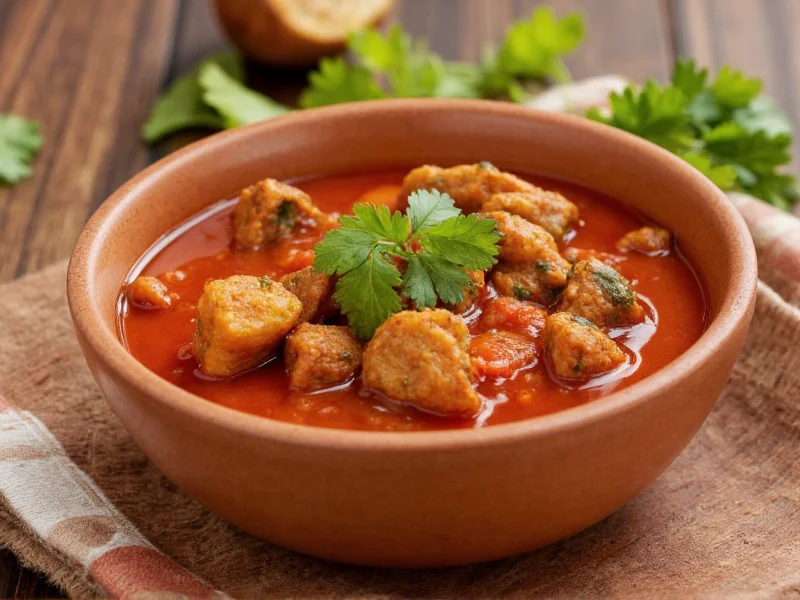Joumou soup represents far more than just a meal in Haitian culture—it's a powerful symbol of freedom, resilience, and national identity. During French colonial rule, enslaved Africans were forbidden from consuming this nutritious squash soup, which was reserved exclusively for their oppressors. Following Haiti's successful revolution and declaration of independence on January 1, 1804, Haitians reclaimed joumou soup as their own, transforming it into an enduring culinary tradition that continues to be prepared and enjoyed every New Year's Day across Haiti and in Haitian communities worldwide.
The Historical Significance of Joumou Soup
The story of joumou soup is intrinsically linked to Haiti's fight for freedom. The term “joumou” refers to a specific type of squash or pumpkin (similar to calabaza or kabocha squash) that grew abundantly in the Caribbean. During the colonial period, this nutrient-rich vegetable was cultivated by enslaved Africans but strictly prohibited for their consumption. The French colonizers considered joumou soup a delicacy reserved for the ruling class, while forcing the enslaved population to survive on meager rations.
When Haiti became the first independent black republic in the Western Hemisphere after defeating Napoleon's forces, eating joumou soup on January 1st became an act of liberation and self-determination. This culinary tradition serves as both a celebration of freedom and a remembrance of the struggles endured during slavery. Each New Year's Day, Haitian families gather to prepare and share this symbolic dish, connecting generations through a shared cultural practice that honors their ancestors' triumph over oppression.
Traditional Ingredients and Preparation
Authentic joumou soup requires specific ingredients that contribute to its distinctive flavor profile and nutritional value. While recipes vary by family and region, certain components remain consistent across traditional preparations:
| Core Ingredients | Preparation Notes | Cultural Significance |
|---|---|---|
| Joumou (Haitian pumpkin/squash) | Peeled, seeded, and cubed | Central symbol of freedom and abundance |
| Beef or goat meat | Browned first for flavor depth | Represents prosperity and celebration |
| Root vegetables (yams, potatoes, malanga) | Cut into bite-sized pieces | Connects to African culinary heritage |
| Cabbage, celery, parsley | Added toward the end of cooking | Represents freshness and new beginnings |
| Epis (Haitian herb seasoning) | Base for flavor development | Essential Haitian culinary foundation |
The preparation process itself holds cultural meaning. Making joumou soup is typically a communal activity, with family members gathering the day before New Year's to prepare ingredients. The soup requires several hours of simmering to develop its complex flavors, with the meat first browned to create a rich base, followed by gradual addition of vegetables. Traditional preparation avoids blenders or food processors—the squash is either mashed by hand or left in chunks to maintain texture. This slow cooking process symbolizes patience and the careful nurturing of freedom.
Modern Interpretations and Cultural Preservation
As Haitian communities have spread globally through migration, joumou soup has traveled with them, adapting to new environments while maintaining its core significance. In diaspora communities across North America, the Caribbean, and beyond, preparing authentic Haitian pumpkin soup has become an important way to preserve cultural identity and pass traditions to younger generations.
Contemporary variations sometimes incorporate locally available ingredients while respecting the soup's symbolic meaning. Some modern recipes might include additional vegetables or adjust spice levels, but the essential components—particularly the joumou squash—remain non-negotiable for those maintaining traditional preparation methods. Food historians and cultural preservationists emphasize that understanding the historical context is crucial when preparing or serving joumou soup, as it transforms the dish from mere sustenance to a meaningful cultural practice.
Nutritional Benefits of Traditional Ingredients
Beyond its cultural importance, joumou soup offers significant nutritional value that contributed to its historical desirability. The Haitian pumpkin (calabaza) at its center provides:
- High levels of vitamin A and beta-carotene for eye health and immune function
- Substantial dietary fiber supporting digestive health
- Rich in potassium, which helps regulate blood pressure
- Contains vitamin C and various B vitamins
- Provides complex carbohydrates for sustained energy
When combined with lean meats and diverse vegetables, joumou soup creates a nutritionally balanced meal that would have provided essential sustenance—explaining why colonial rulers reserved it for themselves while denying it to enslaved populations. Today, this nutritional profile continues to make it a healthful choice that aligns with modern dietary recommendations for whole foods and plant-forward eating patterns.
Common Misconceptions About Joumou Soup
Several misunderstandings persist about this traditional Haitian dish. Some believe joumou soup is simply a pumpkin soup without recognizing its specific historical context. Others mistakenly think any orange squash can substitute for authentic joumou (Haitian pumpkin), not realizing that the specific variety carries cultural significance. There's also a misconception that the soup is only eaten on New Year's Day out of tradition without understanding its deeper connection to Haiti's independence narrative.
Perhaps the most significant misunderstanding is viewing joumou soup as merely a culinary tradition rather than recognizing it as an enduring symbol of resistance and liberation. For Haitians, preparing and consuming this soup represents an annual reaffirmation of freedom and a connection to ancestors who fought for independence. This distinction transforms joumou soup from a seasonal dish into a living historical practice that continues to shape Haitian identity.











 浙公网安备
33010002000092号
浙公网安备
33010002000092号 浙B2-20120091-4
浙B2-20120091-4